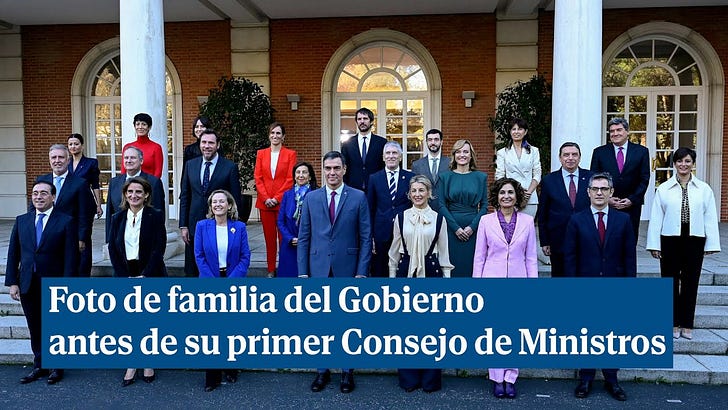💼 This Week in Spain: Meet the New Cabinet
Also: Shakira admits wrongdoing and a local news channel goes after Elon Musk.
By @IanMount and @AdrianBono | November 23, 2023 | Madrid | Issue #34
🎉 Welcome to The Tapa, an English-language, weekly newsletter about all things Spain!
🥜 This Week in a Nutshell: Prime Minister Pedro Sánchez introduced his new Cabinet on Monday and immediately got to work hoping to bring some normality after the turmoil of the last few days weeks months. However, those on the right (and others) opposed to the amnesty of Catalan separatists are not ready to give up.
🙏 Remember that if this email gets truncated at the bottom because it’s too long, just click here to read the rest on Substack.
🙌 But wait, there’s more! The Tapa has its very own LinkedIn page to grow a new community. Please check it out and, if you’re so inclined, follow us here.
🕺If you haven’t subscribed yet, please do so by clicking on the button below.
🫶 And if you already have, please send this newsletter around to your friends and family and help us keep growing.
The new boss, same as the old boss
Prime Minister Pedro Sánchez Introduces His New Cabinet
Now that the election and investiture drama has passed like the world’s largest kidney stone, it was time for Prime Minister Pedro Sánchez to introduce his new cabinet—which, to the surprise of many, wasn’t really that new (but had surprises). So here are some facts:
The number of ministries remains unchanged at 22; 12 of the ministers are women and the other 10 are men.
17 ministries will be led by a center-left PSOE minister, while the other five will be led by someone from further-left Sumar (it's a coalition government, remember?).
13 ministers remain in their job while the other nine are new (more on that below).
All 22 ministers participated in the handover ceremony, in which one by one the outgoing ministers hand over a big black suitcase to their replacements like some sort of Men in Black graduation.
And like in any graduation, there were happy campers and sad ones.
Who’s new?
Let’s start with the new socialist (PSOE) ministers, shall we?
Jordi Hereu, former mayor of Barcelona, is the new Industry minister. After running the Catalan capital from 2006 to 2011, Hereu lost the Barcelona mayoralty for the socialists (to a Catalan nationalist candidate) for the first time since the Franco dictatorship. In his new job, he replaces Héctor Gómez, who was in office only for a few months after replacing Reyes Maroto. She quit as minister to run against Isabel Díaz Ayuso in the Madrid community in May and got whooped. Remember?
Óscar Puente, former mayor of Valladolid, is appointed Transportation and Sustainable Mobility minister. Puente was turfed out in the 23J elections to a PP-led coalition, and afterwards trolled PP leader Alberto Nuñez Feijóo in his failed attempt to become PM.
Ana Redondo, a former councilwoman from Valladolid, is replacing the ejected and controversial Irene Montero from far-left Podemos as Equality minister (more on that below 🙀). She was a Valladolid city department head in the Puente government (see above) until he got turfed out.
Angel Víctor Torres, former regional president of the Canary Islands, takes over the Territorial Policy ministry after he got turned out of his presidency by a PP/Coalición Canaria coalition in the last election (Jeez, ever get the feeling that ministries are rewards for loyal party members who lose elections?)-
Elma Saiz, a former economic advisor in the Navarra regional government, is taking over the Inclusion, Social Security and Immigration ministry. (She for one did not lose in the elections!)
Then there’s also four new ministers from Sumar: Mónica García, Sira Rego, Ernest Urtasun and Pablo Bustinduy.
You may know Mónica García. She was the spokesperson for Más Madrid in the Madrid Assembly and last May she ran for regional president of Madrid against Díaz Ayuso (and lost). She usually goes viral for her epic clashes with Ayuso. Or should we say “used to go viral” as she has now been appointed Health minister.
Sira Rego, who previously was a member of the European Parliament and is of Palestine descent, is taking over the Childhood and Youth Ministry.
Ernest Urtasun, also an MP in the European Parliament, has been appointed Spain’s new Culture minister. He will oversee all sorts of culture, from theater, cinema, music and museums—to bullfighting. That said, he is an anti-bullfighting activist from Catalonia, so this appointment is about the most epic troll of bullfight-loving Vox possible.
Last but not least, there’s Pablo Bustinduy who quit politics back in 2019 after leaving far-left Podemos and is now back in full force as the new Social Rights and Agenda 2030 minister. He is taking over from outgoing Podemos minister Ione Belarra who, just like Irene Montero, had some harsh parting words for Sánchez and this new coalition government (see “Sparks!” section below).
OK, so who’s staying?
This one’s pretty easy as the following ministers remain in their posts with some slight changes:
Yolanda Díaz, Spain’s deputy vice-president and leader of Sumar, remains as Labor minister. As she began her speech on Monday, she was visibly emotional.
Nadia Calviño stays as Economy minister, although possibly not for long as she’s hoping to become the president of the European Investment Bank early next year.
Then there’s the following, who are considered part of Sánchez’s inner circle: Teresa Ribera (Ecological Transition), María Jesús Montero (Treasury), José Manuel Albares (Foreign Affairs), Margarita Robles (Defense) and Félix Bolaños, who remains as minister of the Presidency and also takes over the Justice Ministry.
Meanwhile, Fernando Grande-Marlaska remains as Interior minister, as well as Luis Planas (Agriculture) and Diana Morant (Science and Innovation) who is also now in charge of the Ministry of Universities. Grande-Marlaska’s continuation is a surprise, as he’s taken the heat for a lot of controversies, including the deaths of 23 African migrants trying to enter Melilla in 2022.
Sparks!
Not everyone likes to be told to go home and shut up (well, no one does) and an angry Irene Montero (known for the “success” of her “Solo sí es sí” law), who was, um, “replaced” as Equality Minister, lit up the handover ceremony.
Unwilling to go gentle into that good night, the
fireddeparting Equality minister spent her time on the mike in the handover wishing her successorgoodbitter luck—and slamming former supervisor Pedro Sánchez."Dear Minister Belarra,” she began, addressing her fellow Podemos layoff-ee Ione Belarra. “Today Pedro Sánchez is throwing us out of this Government. It is precisely for having done what we said we would do: putting institutions at the service of advancing feminist rights.” (Note: Also for being an electoral liability and sort of annoying to the gold-medal Machiavellian who is Pedro Sánchez.)
So much for pleasant goodbyes! It’s been an honor and pleasure to serve with you too.
And more sparks!
Vox boss Santiago Abascal (aka the Far-Right Freddy Mercury) took the opportunity to head to the European Parliament (meeting in its second home in Strasbourg, France) to give a subtle and lighthearted indictment of Prime Minister Pedro Sánchez and his investiture and legislative deal with the Catalan separatist party Junts.
“I am here to contribute to the denunciation of Sanchez’s coup,” he began. “Sánchez’s coup against the constitution, against the nation, and against the state. At times like this, it’s important to call things by their name.”
“We find ourselves in an unprecedented situation,” he continued, “facing a politician offering amnesty to other politicians in exchange for votes to remain in power. We don’t believe that there could be a larger act of corruption to obtain an investiture.”
But the complaints did not end with Abascalian hyperventilation. The RENFE unions (who carry us around the country in regional and long distance trains) have set a strike on various days from Nov. 24 to Dec. 5 to protest the transfer of the RENFE trains in Catalonia (along with their employees) to the regional government. Some 1,500 trains will be canceled because of the strike.
May you live in interesting times! We certainly do.
🔔 A Message From Our Sponsor
Bucólico Café is a project of connection that was born as a specialty coffee shop.
We value time and understand that it represents both a cycle and an instant—chronology and nostalgia. Bucólico is a space that connects one’s soul with the purity, lightness and beauty of the countryside—while being in the city. Via a cup of coffee, a piece of cake or a song…
Located on Calle de Barbieri 4 — a few blocks from Plaza Chueca — Bucólico reassures the soul with a feeling of home.
Follow Bucólico Café on Instagram.
💬 Five things to discuss at dinner parties this week
1. 🤣 Elon Musk vs. Canal Sur
Hold up one second! Before you click on that video above, let us explain what’s going on.
You’re probably aware that there’s been a lot of drama surrounding OpenAI (the company behind ChatGPT) and the firing of its founder and CEO Sam Altman (who’s now been rehired!). It’s all too long to explain, but basically the war between the company’s board and Altman had all the ingredients of a bad telenovela.
Enter Elon Musk (aka the king of trolling), who decided to mock the whole thing by posting a video of a Spanish guy with a contagious laugh.
The video included subtitles that had nothing to do with what he was saying and, for the untrained ear, it looked like he was just laughing at the OpenAI story.
The thing is, that was not just a random guy speaking Spanish. He was famed sevillano comedian Juan Joya Borja, also known as Risitas (“Giggles”), during a historic appearance in 2002 on Ratones Coloraos, a TV show hosted by Jesús Quintero on Canal Sur, a network that’s part of Andalucía’s public broadcasting company.
In the bit, Borja is trying to explain a funny anecdote from when he was working as a dishwasher at a beach restaurant, but he just kept laughing uncontrollably and in a heavy andaluz accent, taking a long time to tell the story.
Someone uploaded the clip to YouTube in 2007 and the rest is history. It garnered millions of views on the platform and immediately became a meme, with people all over the world sharing his laugh and image. While Risitas died in 2021, he remains one of Spain’s most popular and beloved memes.
Now go watch the clip above, which, as they say, is historia de España.
Considering he’s a national treasure, we’re all very protective of him. So it’s no surprise that after Musk’s post, the official Twitter X account of Canal Sur’s TV show Andalucía Directo, tweeted (exed?) back at the Tesla billionaire to ask for the payment of copyright use.
“Hello Elondo!” they say sarcastically. “Here’s the link so you can request the search, sales, licensing and delivery of footage owned by Canal Sur Televisión,” adding that price of licenses depend on volume, type of production, and scope of distribution.
"For you, it comes out as 'A pagar,' which means 'pay now'," the tweet ends.
Musk has not responded (at least not yet) but we’re guessing whoever is responsible for the Andalucía Directo X account is not his number one fan.
2. 💰 Shakira admits hips did lie, settles tax case
Colombian singer and global superstar Shakira was back in Barcelona this week to settle once and for all a court case that’s been bugging her (and all of us) for years.
Remember how before her (very public) breakup with footballer Gerard Piqué she lived in the Catalan capital? Yes, she lived there for a while. However, the exact number of years varied, depending on who you asked.
Shakira claims she moved there in 2014, but Hacienda (Spain’s Tax Agency) claimed that actually happened in 2012. And because she’s an international pop star who spends long periods of time flying around the world, it came down to counting the number of days she spent in Spain during those two years. Hacienda’s verdict? She was totally living here.
Prosecutors were seeking over eight years in jail over accusations that she failed to pay €14.5 million in income tax between 2012 and 2014. They said that she had listed the Bahamas as her primary residence during that period but had in fact spent the most of her time in Spain while she was with Piqué.
While we were all waiting for a steel cage match/mud wrestling finale, Shakira reached a last-minute settlement with prosecutors, admitted to fraud to avoid trial and agreed to pay a fine of €7.5 million, plus €432,000 to avoid serving a three-year prison sentence imposed by the Barcelona court. End of story.
Shakira has always denied any wrongdoing, and still does. Sorta. In a written statement, the singer said she felt she was innocent, but explained that “she has to choose her battles” and that the most important thing for her to do right now is to ensure that her children live a full life and “focus on what’s really important”.
“I have reached the conclusion that winning is not a victory if the price is that they rob you of so many years of your life,” she explained. That said, €8 million is a lot.
Now that Shakira’s living in Miami, at least she will no longer have to run into her ex—or the prosecutors.
3. 👮 Dragnet lightens in daylight shooting of Vox/PP pol
Police have arrested three people in the daylight shooting of Alejo Vidal-Quadras, the founder of Vox (and former head of the PP in Catalonia) who was shot in the face two weeks ago in Madrid by a gunman on a motorcycle in a pretty obvious assassination attempt.
The arrested three: One man of Spanish nationality (reportedly a 22-year-old named Adrián) was captured in Fuengirola, near Málaga, while the other two—a Spanish man and his English girlfriend—were arrested in Lanjarón, near Granada.
But not the shooter: The man in Fuengirola is suspected of providing the motorcycle used by the gunman and his getaway driver, and the man in Granada is thought to have hired the assassin and planned the shooting. The British woman is being investigated to determine her involvement.
And the assassin? Police are looking for a man of Tunisian and French nationality who, according to ABC, already has an arrest warrant for a murder in Paris. He is thought to be a French-speaking man police stopped on the motorcycle near the Zarzuela palace (the King’s residence) just the day before the shooting. He (if it was him) told the police he was lost and they pointed him on his way.
How it all unraveled: A BMW motorcycle was found, torched, in an industrial park in the Madrid suburb of Fuenlabrada, just hours after the shooting. Police were able to recover its serial number, which led them to the suspect in Fuengirola.
The surveillance footage that ID’d the BMW near the shooting also caught another suspicious vehicle, which was apparently following Vidal-Quadras’s movements in the previous days. That vehicle by chance made its way into the police registry when it was found illegally parked in Lanjarón. Alerted to its discovery, the police tracked down its drivers—the Spanish/English couple.
The obvious trail and failure to kill the target suggests that the wanna-be assassin’s band was anything but professional—and leading some to question whether Iran’s intelligence services really had anything to do with it (see below).
So what’s this all about? It’s not totally clear who would want to kill Vidal-Quadras, but many indications point to Iran. Vox was founded in 2013 in part with funds from the National Council of Resistance of Iran (NCRI)—an anti-regime exile group once classified as a terrorist organization in the U.S. and EU—arranged by Vidal-Quadras,
Spanish ties: According to an El País story from 2020, “Every year, the NCRI organizes a large event in Paris where Alejo Vidal-Quadras has been a guest speaker on more than 15 occasions. Other guests have included Spain's former prime ministers José María Aznar, of the Popular Party (PP), and José Luis Rodríguez Zapatero, of the Socialist Party (PSOE).” Still more attendees included members of the U.S. right, such as John Bolton, Rudy Giuliani and Newt Gingrich.
The Iranian regime is not known to be super-tolerant of the opposition, leading to widespread belief that it was behind the assassination attempt.
This speculation was not hurt by Vidal-Quadras, who reportedly pointed to Iran immediately after the shooting. He was also apparently on an Iranian “black list” of terrorists (i.e. a sanctions list), and the NCRI’s leader blamed Tehran as well.
And, Spanish papers note that the man arrested in Granada was a follower of Shia Islam (the kind most practiced in Iran), though that’s hardly enough to base a case on.
And how’s Vidal-Quadras? It’s nice of you to ask. He’s still in hospital in Madrid and has released a document about the shooting. He referred to it as a “terrorist attack” that he “miraculously survived, although the bullet destroyed my jaw.”
4. 👶 Go forth and multiply (with or without a 💍)

More children were born to women out of wedlock than in wedlock in Spain in 2022, for the first time since records have been kept. At the same time, the number of births in total was way down at 329,251, down 27.6% since 2012 according to Spain’s statistics bureau, the INE.
Madres solteras: The number of children born to unwed mothers last year—165,062—crept past those born to wedded mothers, 164,189. Because, well, the whole getting married thing isn’t the “must-do” it once was. Surprise!
But a marriage boom? Indeed, it’s true! There were 179,107 weddings last year, up 20.5% from the year before. So, like, that means there will be a married baby boom? Nah. It’s just a blip because during COVID and its aftermath in 2020 and 2021 it was actually difficult to get married. So this is just catchup.
It’s all part of a long running trend in Spain and many other wealthy countries, especially in southern Europe: fewer marriages, older mothers and fewer children.
Women got married later and had fewer kids: The average age for a woman to get married in 2022 was 36.6, up from 33.3 in 2012; the average age for childbirth was 32.6, up from 31.6; and the average number of children was 1.16 per woman, compared to 1.32.
The means a population collapse, right? If you look at it one way, yes. The annual crecimiento vegetativo (population growth—gotta love it in Spanish more, though) was 52,226 in 2012, while it dropped to a -133,250 last year.
But the immigrants will save us! It’s true. First, Spain’s immigrant women have more kids (1.35 vs 1.12) and younger (30.5 vs 33.1). And second, Spain continues to have a good number of immigrants.
Which means Spain’s population is growing. Spain’s population at the beginning of 2023 was about 48 million, compared to 47.5 million the year before.
Note to Vox: Mars Needs Women. Spain needs immigrants.
5. 🥘 Spain cooks good!
Spain’s chefs deserve a standing O. In the Best Chef Awards released this week, Spain’s mohawk-sporting Daviz Muñoz (aka Mr. Cristina Pedroche) of Madrid’s DiverXO won the #1 top chef for the third year running. Which is pretty amazing.
Muñoz wasn’t alone. Five of the top 10 restaurants were run by Spanish chefs, and 14 of the top 100 chefs were Spanish, making Spain (in the words of the award organizers) the “most influential country.”
The other Spanish chefs: Albert Adrià (#2) of Barcelona’s Enigma: Andoni Luis Aduriz (#5) of the Basque Country’s Mugaritz; Mateu Casañas, Oriol Castro and Eduard Xatruch (#7) of Disfrutar, also in Barcelona: and Joan Roca (#8) of El Celler de Can Roca in Girona.
Now, these awards are obviously sorta ridiculous. Totally untransparent, probably subject to backroom dealing, and all that. But if you’re going to play, it’s better to win, right?
What they have in common: Crazy expensive tasting menus, a chemistry lab-like approach to cooking (it looks like an olive but tastes like salmon!), an obsession with high-quality raw materials and often a highfalutin “concept” (Enigma’s website address is even enigma concept).
But all snark aside: They do amazing stuff, with an eye toward inducing a kind of sensorial overload. Many combine food with visuals (DiverXO’s website presentation has more than a little The Cook, the Thief, His Wife & Her Lover to it).
Quick history: Spain’s culinary revival, or perhaps implantation as an international food force, arguably began with Juan Mari Arzak, who turned his family restaurant Arzak in San Sebastián into an international revelation, creating La Nueva Cocina Vasca, garnering three Michelin stars, and inspiring chefs like Gastón Acurio.
Ferrán Adria (brother of Albert) is arguably the best known because of elBulli, and his invention of mad high-cuisine techniques like using a nitrous oxide canister to spray out a mix of a main ingredient (say, raspberries or mushrooms), and a gelling agent to create culinary foam; and “spherification,” which encapsulates liquids within delicate spheres of gelatin.
Honestly, our only problem with these restos is the €€€€. Unless you get invited as a journo (ahem, we’re willing to accept), they exist merely as concepts to most people. DiverXO, for example, is about to move to the La Finca, a gated community in Pozeulo de Alarcón, the highest income municipality in Spain.
But that’s fine. We leave you with Muñóz and Pedroche celebrating the win.
🙏 Before you go, please remember to share this newsletter with your friends on social media. The more we grow, the more information we’ll be able to offer each week.
We’ll be back next week with more.








Thank you for bringing the word "mayoralty" to my attention.